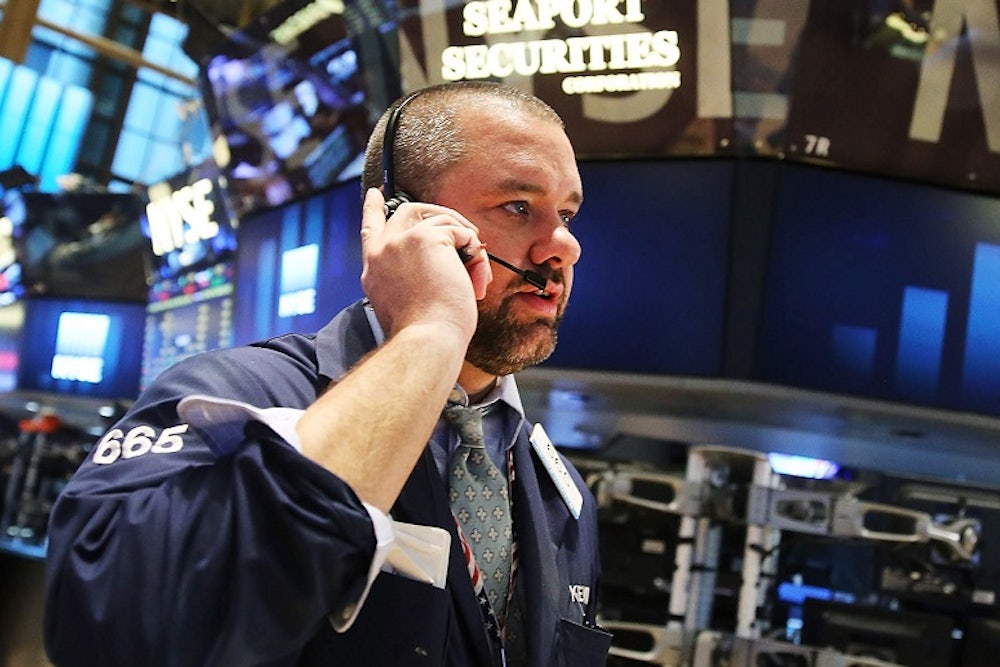Wednesday was an ugly day for the global economy. British and German stocks each fell around 3 percent. Greek stocks fell 6 percent. (That’s huge.) In the U.S., a trifecta of economic indicators—retail sales, the producer’s price index, and a manufacturing report—were all disappointing. That sparked an early morning selloff here with investors fleeing into safe-assets like U.S. Treasuries. The interest rate on the 10-year-bond hit a low of 1.86 percent, a drop of more than 16 percent. (Again, that’s really big.) Equity markets closed down around 1 percent and U.S. Treasuries rebounded, closing the day around 3 percent.
This volatility has been a feature of the market during the past few weeks and is a signal that something is not right with the global economy. Last week, the International Monetary Fund downgraded its growth forecasts for just about every major developed nation, although it conspicuously avoided one country: the United States. There’s good reason for that too. While markets may be panicking, the U.S. is well suited to withstand any global economic weakness.
Why did markets panic Wednesday? It’s tough to pinpoint an exact reason, but economists have expected weak growth in the Eurozone, China and Japan. “The stuff going on overseas is not great, but it’s not outside the realm of the baseline,” said Moody’s chief economist Mark Zandi. “Nobody really expected Europe to do all that well.” Even worse, investors are increasingly concerned that policymakers don’t have the tools to combat economic crises.
The Eurozone economy still hasn’t recovered from the Great Recession—not by a longshot. German-imposed austerity has been a disaster and the European Central Bank has made crucial policy mistakes that have kept the recovery from accelerating. All of this has created fears of deflation, in which prices fall (as opposed to inflation, when they rise). That may sound like a good thing, but it’s not. Deflation creates a nasty-spiral where consumers, expecting prices to fall, cut their spending. That forces companies to lay off workers and cut prices. Then this cycle repeats itself. That’s the worst fear of monetary economists, but with inflation at 0.3 percent, the Eurozone is not that far away.
The IMF also cut its growth forecasts for both China and Japan—again, because it sees the specter of deflation. On Wednesday, China reported that consumer prices increased just 1.6 percent over the past year, a five-year low. Japan has been dealing with deflation fears for nearly two decades and its inflation is just 1.1 percent (after adjusting for changes to its sales tax). There are also significant concerns that China’s housing bubble will burst.
International crises—such as the one in Ukraine and the wars in Iraq and Syria—are also worrying investors. An even greater fear is the current Ebola outbreak. As Andrew Ross Sorkin explained in Tuesday’s New York Times, it’s nearly impossible to model the potential economic consequences of the disease.
So it’s pretty easy to see why experts are uneasy about the global economy. But why aren’t they gloomy about the U.S., too? The dollar has risen significantly over the past few months against the Euro, Pound and Yen. That makes it cheaper to take a vacation to Paris or Tokyo, while making U.S. products more expensive for Parisians or the Japanese to buy. That’s bound to hurt U.S. exports.
But global economic weakness also helps the U.S. One way is oil prices: Thanks to reduced demand, crude is more than 20 percent cheaper than it was at the end of July. That has pushed down the price of gas and it means consumers have more money to spend on other things. Lower interest rates will also make it cheaper for businesses to invest and consumers to buy a home. The Federal Reserve may also wait longer until it first raises interest rates as well. “There are a lot of economic cross-currents,” said Zandi. “If you do the arithmetic, they all kind of wash.”
He wasn’t alone in this belief either. “The retail sales and producer price index were both weak, but in general, we are seeing more positive economic surprises than negative,” said Eric Lascelles, chief economist at RBC Global Asset Management. “This is an economy that still seems to be lining up with quite robust growth.”
That doesn’t mean the current U.S. recovery is acceptable. Wage growth over the past year is just keeping up with inflation. But at the very least, the U.S. economy is prepared to weather a slowdown in other developed nations.
